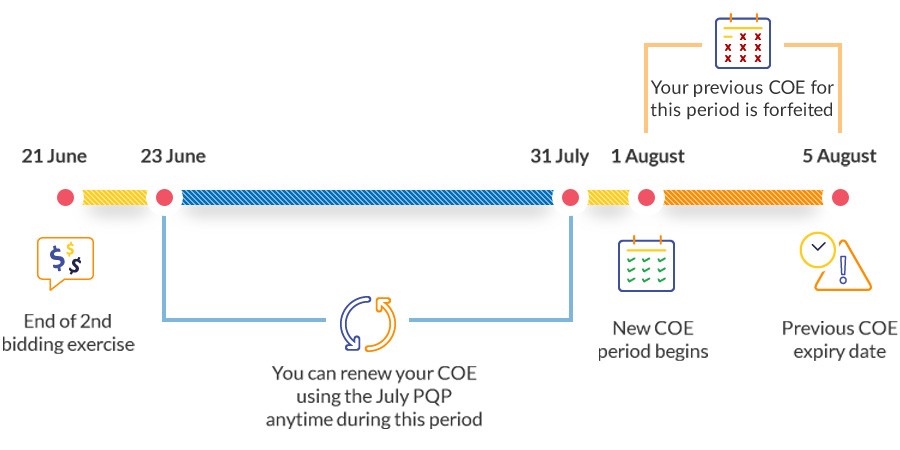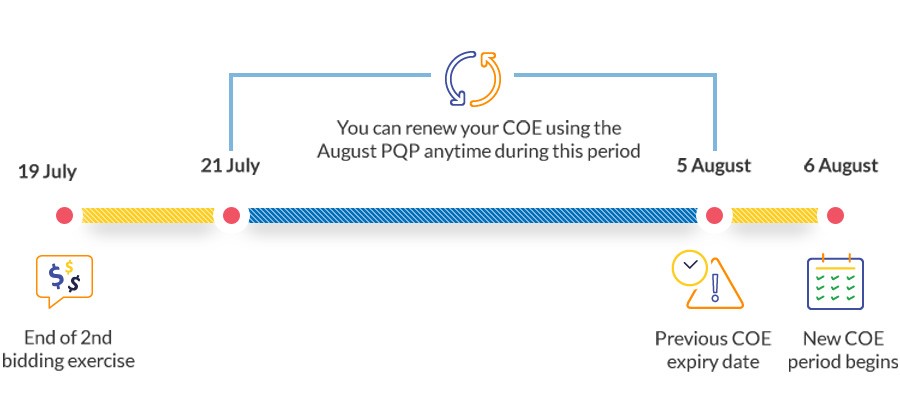A Certificate of Entitlement (COE) gives you the right to own and use a vehicle in Singapore. When your vehicle’s COE expires, you can choose to renew it if conditions are met.
At a glance
| Understanding COE renewal |
You must renew your vehicle’s COE before it expires. Otherwise, the vehicle must be deregistered and disposed of. |
| Renewing your COE | You can renew your COE for a period of 5 years or 10 years, depending on your vehicle category and the vehicle's statutory lifespan.
Find out how much you need to pay.
You can renew your COE online.
There are late fees and other consequences for late renewal. |
| Related digital services |
Enquire COE validity and PQP rates To view or print payment receipts for past transactions, login to your dashboard. |
How to renew your COE
Pay the Prevailing Quota Premium (PQP) for your vehicle category to renew your COE. The PQP is the moving average of the Quota Premiums (QPs) in the last 3 months, and varies monthly depending on the QPs in the bidding exercises conducted in the last 3 months.
Months in which no bidding was conducted are excluded from the calculation. As there was no bidding conducted in April 2020, May 2020 and June 2020, the PQP for May 2020, June 2020 and July 2020 will be based on the average of the QPs in January, February and March 2020.
You can renew your COE for a period of 5 or 10 years, depending on the category of your vehicle.
Category A |
For COEs obtained before the May 2022 1st COE bidding exercise: Car with engine capacity up to 1,600cc and Maximum Power Output up to 97kW (130bhp)
For COEs obtained from the May 2022 1st COE bidding exercise onwards: Non-fully electric cars with engines up to 1,600cc and Maximum Power Output up to 97kW (130bhp); and fully electric cars with Maximum Power Output up to 110kW (147bhp) |
Category B |
For COEs obtained before the May 2022 1st COE bidding exercise: Car with engine capacity above 1,600cc or Maximum Power Output above 97kW (130bhp)
For COEs obtained from the May 2022 1st COE bidding exercise onwards: Non-fully electric cars with engines above 1,600cc or Maximum Power Output above 97kW (130bhp); and fully electric cars with Maximum Power Output above 110kW (147bhp) |
Category C |
Goods vehicle and bus |
Category D |
Motorcycle |
Category E |
Open – all except motorcycle |
If your vehicle was registered using Category E COE, you must renew its COE under the vehicle’s corresponding category A to D.
E.g. For a bus whose COE was previously bid under Category E, its COE must be renewed under Category C.
If your car was registered or converted using Temporary COEs (TCOEs) obtained before the 1st bidding exercise in February 2014, it will be classified based on its engine capacity as follows:
If its engine capacity is 1,600cc and below, then it falls under Category A. If its engine capacity is 1,601cc and above, then it falls under Category B.
You can renew your COE online.
Renew your COE before it expires to avoid late renewal fees.
Renewing COE for 5 years
You need to pay 50% of the PQP to renew your COE for 5 years. Please check your vehicle category below for what you will need to know when renewing your COE for 5 years.
For vehicles from Categories A, B and D
You can renew your COE for 5 years only once. When the 5–year renewal period is over, you cannot renew again and will have to deregister the vehicle.
For vehicles from Category C
When you renew your vehicle’s COE for 5 years, you can still continue to renew it after the first 5-year renewal period is over. However, the subsequent renewals can only be for 5–year periods. Once your vehicle reaches the end of its statutory lifespan , you can no longer renew its COE, and the vehicle will be deregistered.
Renewing COE for 10 years
You must pay the PQP for your vehicle category to renew your COE for 10 years.
For vehicles with no statutory lifespan (i.e. Categories A, B and D), there is no limit to how many times you can renew your COE in 10-year periods.
Vehicle |
Statutory lifespan |
|---|---|
Car |
No statutory lifespan (except for tuition cars registered in the name of companies, where a 10-year statutory lifespan is applicable) |
Motorcycle |
First Registration Date before 1 July 2003:
Statutory lifespan expires on 30 June 2028
First Registration Date from 1 July 2003, or motorcycle is under Vintage (Restricted)/ Revised Vintage/ Classic Vehicle Scheme:
No statutory lifespan
Click here to check the First Registration Date of your motorcycle. |
Omnibus |
17 years |
Excursion Bus, Private Bus, Private Hire Bus, School Bus |
20 years |
Goods Vehicle |
20 years |
Taxi |
Taxi Lifespan
Non-electric taxi 8 years
Electric taxi registered before 8 years 15 September 2022 and have not opted in for a 10-year statutory lifespan
Electric taxi registered: 10 years - From 15 September 2022; or - Before 15 September 2022 and have opted in for a 10-year statutory lifespan |
How much PQP you need to pay
PQP is the moving average of COE prices in the last 3 months. It varies monthly, depending on the COE prices of the bidding exercises in the last 3 months. Months in which no bidding was conducted are excluded from the calculation. You can find out the PQP for each month once the 2nd bidding exercise in the previous month is over. Check the latest PQP.
To renew your COE, the PQP rate for your renewal depends on the date you choose to renew and your COE expiry date.
For example, if your COE expires on 5 August 2017, you have 2 choices. You can:
1. Renew early before your COE expires
2. Renew in the month your COE expires
PQP rate for late COE renewal
When your COE expires, your vehicle is automatically deregistered and you cannot use it on the roads until you have renewed the COE.
If you renew your COE after its expiry date, you must pay the PQP of the month your COE expires. You will also have to pay a late renewal fee.
If you do not renew your COE within 1 month of the expiry date, you will have to dispose of your vehicle immediately.
For example, if your COE expires on 5 August 2017, you must pay the PQP for August 2017 and late renewal fee if you renew late. If you fail to renew by 5 September 2017, your vehicle will have to be disposed of immediately.
PQP rate for Weekend Car/ Off-Peak Car/ Revised Off-Peak Car (WEC/OPC/ROPC)
Online (Available all day except from midnight to 6am)
Late renewal
Avoid late renewal fees by renewing your COE on or before the date your COE expires. You will need to pay a late renewal fee if you renew your COE after it expires. Check the late fees applicable to your vehicle below.
However, if you do not renew your COE within 1 month of your COE expiry, you will have to dispose of your vehicle immediately.
| Vehicle type | Late renewal fee |
|---|---|
Motorcycle |
$50 |
Private Motor Car (1,000cc and below) |
$50 |
Private Motor Car (1,001cc to 1,600cc) |
$100 |
Private Motor Car (1,601cc to 2,000cc) |
$150 |
Private Motor Car (2,001cc to 3,000cc) |
$200 |
Private Motor Car (More than 3,000cc) |
$250 |
Business Service Passenger Vehicle (Company Car) |
$250 |
Goods Vehicle and Public Service Vehicle |
$250 |
Others |
$250 |






